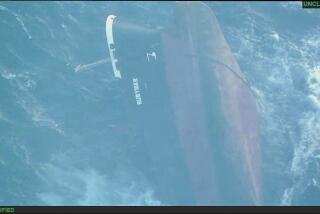Nigeria attacks disrupt oil flow
- Share via
WASHINGTON — Amid surging demand for oil, a severe bottleneck has developed in production of high-quality West African crude, alarming world leaders and demonstrating a new vulnerability in fragile oil markets.
With production declining elsewhere, consumer nations had been looking hopefully toward Nigeria. But rebels who have waged an increasingly bold campaign in the oil-rich Niger Delta have slashed the country’s output in their most recent attacks.
The deepening disruptions in Nigeria represent a “huge hole in world oil markets,” said Daniel Yergin, a top oil expert and chairman of the Cambridge Energy Research Associates consulting firm, who warns of an increasingly crisis-prone oil economy.
A nighttime raid by Nigerian militiamen in speedboats in mid-June forced the shutdown of a Shell offshore platform and shocked the industry, demonstrating that even production facilities far from land are no longer safe.
That attack, among others, has cast doubt on whether oil companies will continue investing billions of dollars in a region plagued by violence and corruption. And it has raised questions about whether the Bush administration has done enough to pressure Nigeria’s government to find a political solution to the unrest.
The disruptions also signaled the sensitivity of the oil markets to political and security pressures at a time of tight supplies, when the smallest fluctuations can quickly drive up prices.
Violence regularly disrupts oil flows from Nigeria, Iraq and Colombia; the threat of conflict also hangs over the output of Venezuela, and Iran, Saudi Arabia and other Persian Gulf states, boosting prices.
Nigeria’s petroleum infrastructure is threatened by militias motivated by anger that the country’s leadership and international oil companies were not sharing the oil wealth with the impoverished residents of the Niger Delta.
But though the movement has its origins in political grievances, many experts regard the militias as youthful crime gangs that steal oil, carry out kidnappings and buy weapons in a sophisticated scheme that benefits Nigerian military and civilian leaders as well as warlord commandants.
The gangs, whose arms include surface-to-air missiles and bazookas, have learned how to siphon thousands of gallons of crude into barges and send it to the high seas for sale on world spot oil markets.
Since 2005, attacks have cut 20% to 30% from the nation’s oil output. But recently, the oil conflict has combined with labor strikes and other problems to reduce output by 1 million barrels a day, down to an average 1.8 million barrels a day.
The decline in West African production represents a fraction of U.S. consumption, about 21 million barrels a day. But it has a powerful effect on oil markets at a time when output from Mexico and Venezuela is falling, and Iraq’s production languishes below prewar levels.
“The result of this is a much tighter market, in terms of balance between supply and demand, than you have had for decades,” Yergin, the oil expert, testified before Congress last week.
The effects of the conflict in Nigeria were clear last weekend, as the Saudis announced at an international oil conference in Jidda that they would increase output.
Ordinarily, that might have set off a slide in prices; instead, they rose in part because of concern over the rebel raid on Shell’s Bonga offshore platform.
The disruptions in Nigeria have led to calls for the United States, Britain and other world powers to take concrete steps toward a peace deal between the Nigerian government and the rebels.
Some senior U.S. military and North Atlantic Treaty Organization officials have urged the Bush administration to build up Nigeria’s weak coastal navy, or even use U.S. naval vessels along with other regional forces to patrol Nigerian waters, said officials who spoke about the internal discussions on condition of anonymity.
U.S. officials say they are taking limited steps to strengthen the Nigerian military. But, despite intermittent reports in the Nigerian news media, they said the United States has no intention of intervening militarily.
The Bush administration has tried to spur a political settlement with the rebels. But U.S. officials have complained that the efforts have met with resistance, in part because civilian and military officials are content with the situation, which provides revenue and helps maintain their influence.
“All the actors in the delta are benefiting from the status quo,” said one U.S. official, who declined to be identified because of the diplomatic sensitivity of the issue. “They’ll do their best to stop any peace process; it threatens their business.”
Some analysts believe the Bush administration could push harder for a peace deal. Jim Kingsdale, a Colorado energy investor and analyst, said the Nigerian standoff called for “adult supervision” and warned last week that it could lead to still higher prices in coming years.
Nigerian President Umaru Yar’Adua won favor with U.S. officials after his election last year by signaling that he would seek an economic plan as part of a peace deal. But there has been little progress.
Meanwhile, the Niger Delta militias have become increasingly confident.
For most of the last three years, they have used a network of creeks and swamps to prey on onshore pipelines and other facilities. In response, the companies shut down some onshore sites, expanding offshore capacity and massing private security around their installations.
The offshore speedboat raid this month raised new questions about security in the region. Still, J. Anthony Holmes, a former U.S. diplomat who held several posts in Africa, said a military response that included non-Nigerian forces would be deeply unpopular. And U.S. influence is limited by Chinese and Russian interest in the Nigerian market.
“The fact is,” Holmes said, “we just don’t have a lot of leverage.”
--
More to Read
Sign up for Essential California
The most important California stories and recommendations in your inbox every morning.
You may occasionally receive promotional content from the Los Angeles Times.











